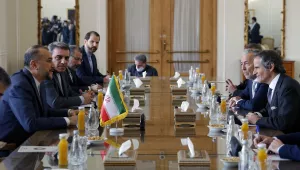Graham Allison, Director of the Belfer Center for Science and International Affairs, testified before the Senate Foreign Relations Committee on lessons from prior weapons of mass destruction negotiations for the current talks with Iran over its nuclear program. Drawing on arms control agreements during the Cold War and the post-Cold War era, he argued that negotiated agreements on nuclear weapons are a crucial part of American national security although they are complementary to, and not an alternative to, other military, diplomatic, covert, and economic means of geopolitical competition, that no arms agreement is perfect from the perspective of both sides as they are by nature negotiated settlements, claims that the United States can't or should make agreements with "evil" regimes or those that cannot be trusted are false, the United States can make agreements with regimes that it is trying to contain or subvert in other ways, and which are in turn engaging in other actions that are threatening American citizens and soldiers, arms control agreements overall have reduced the number of nuclear weapons and helped reduce the likelihood of war, and that there is no "good" or "bad" agreement on its own, but only when assessed against alternative options.
Allison, Graham. “Lessons Learned from Past WMD Negotiations.” June 26, 2015
The full text of this publication is available in the link below.



